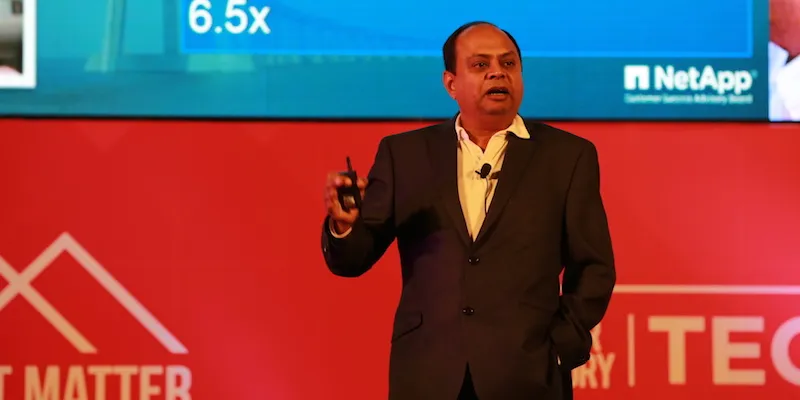“Disrupt or be disrupted” — NetApp Senior VP says large companies need to think like startups
To survive and outlast competitors in a market undergoing digital transformation, it is important for large companies to think like startups, says NetApp Senior VP Deepak Visweswaraiah.
Startups are taking over the world. From Silicon Valley in the West to our very own Bengaluru, startups are giving large companies and traditional businesses a run for their money.
At TechSparks this year, Deepak Visweswaraiah, Senior VP and Managing Director of NetApp, explains why large companies need to think like startups .
The first advantage that startups have is the ability to think about a problem without carrying the baggage of legacy. At the same time, their focus on the need to innovate and transform is what makes them achieve both their short-term and long-term goals. Speaking about NetApp, which has been operational for 25 years, Deepak said the reason for its success is that it still runs on a startup DNA.

Explaining this, he said that like most startups, NetApp focuses on using innovation to solve customer problems. It also competes by focusing on product-improvement, a textbook practice of the startup culture. Innovation and product-improvement are the two primary concerns mapping a startup disruption, according to the NetApp Senior VP.
“The world is changing, and a rapid digital transformation is at its core, causing huge disruption. The cost of doing business is important, but so is the ability to satisfy one’s customers. Customer needs are changing, they want to consume similar technologies in different models. The way you do business is actually changing,” said Deepak.
In a sense, the digital transformation over the past decade is marking the rise of the startup ecosystem. According to Forbes, about two-thirds of the Global 2000 companies had their CEOs put digital transformation at the centre of their strategy towards becoming viable businesses. Why is such a disruption taking place?
According to Deepak, if one looks at the past 15-20 years, one can notice a shift in fixation from hardware to software. There is now a drive towards data management. This change, in how companies are looking at the value of data, indicates how data is the currency of the digital era.
Considering the way data is growing, one can judge by its variants that data is all over the place, and with cloud technologies becoming ubiquitous, it is being distributed at multiple centres. This data, says Deepak, is dynamic because it’s changing in real time. In a sense, data-centric organisations are the businesses of the future.
Handling this kind of data and the disruption that it’s bringing in is what large companies need to learn from the journey of successful startups. Large companies used to be sure of running stable for a good number of years — something that startups too are now increasingly confident of. Because the latter are now adhering to the technology that is bringing in this transformation, they are now hopeful that they won’t be disrupted for the next 15-20 years. This is what established businesses should begin to take note of.
Commenting on the need to capitalise on this kind of ‘disruption’, he says, “If you don’t think about disrupting yourself, somebody else is going to. You are the disruptor or you are getting disrupted”.
According to Deepak, following are the three things that large companies need to learn from startup-culture in terms of growth, scale, and benefits:
- Stay relevant
- Consistently and constantly innovate
- Disrupt or expect to disrupted
“If you’re focussed on solving the customer problem, staying relevant and learning constantly, you are good to go,” he concludes.







